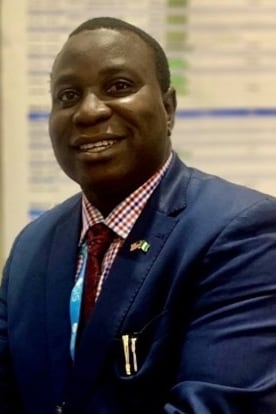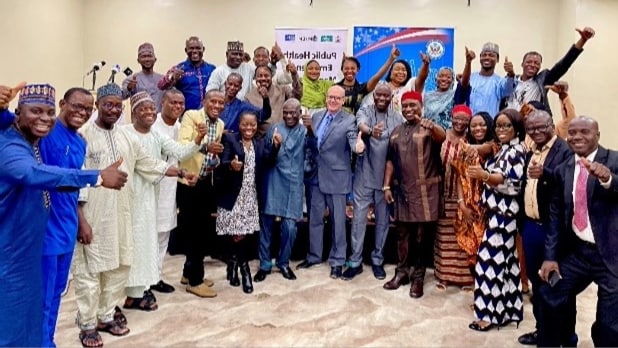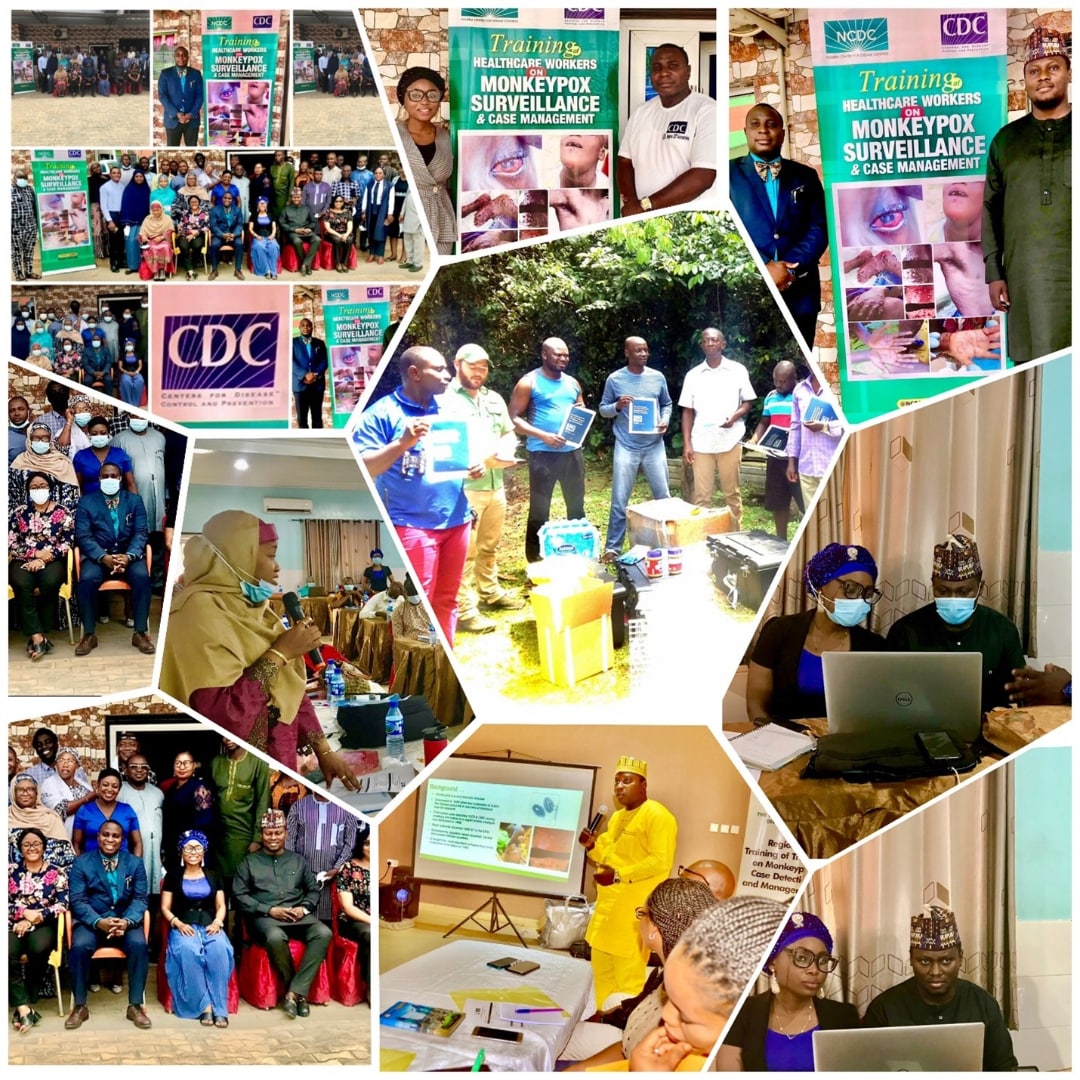At a glance
- Seeing how diseases affect entire communities motivated Dr. Muhammad Saleh, a Nigerian physician, to shift his career towards public health.
- With the help of CDC, Dr. Saleh's team implemented initiatives to improve his country's public health emergency and response capacity, including establishing Nigeria's Public Health Emergency Operations Center, launching the Public Health Emergency Management program, and improving border health security.
- Thanks to these efforts, Nigeria has the potential to lead in global health security and establish itself as a center of excellence in public health emergency management, thereby assisting other African nations.
Supporting Communities through Humanitarian Aid

Dr. Muhammad Saleh is the Senior Emergency Management Specialist for CDC's Division of Global Health Protection (DGHP) in Nigeria, where he has trained and certified over 100 Nigerian emergency response managers.
Here, Dr. Saleh reflects on his path to public health and his work improving emergency response in Nigeria as part of CDC.
I am a physician by training. However, several years ago, when cholera ravaged my hometown of Bida (Niger State), I decided to pursue a career in public health. In 2013, when the initial 57 abducted schoolgirls fled from the captivity of Boko Haram extremists in northern Nigeria, I volunteered to lead a public health team to provide basic healthcare services to the teenagers. The abduction of the schoolgirls and my team's efforts gained international attention from the humanitarian community and facilitated the distribution of essential life-saving aid to vulnerable and displaced communities. I have witnessed how disease can impact entire communities, cities, and countries. This whole-of-society approach is what inspired me to advance my career path in public health with the hopes of having a greater impact in lowering morbidity and mortality in Nigeria.
Strengthening the Public Health Workforce to Address Emergencies in Nigeria
In response to a 2017 meningitis outbreak, my team and I helped to establish the national Public Health Emergency Operations Center at the Nigeria Centre for Disease Control and Prevention (NCDC) in Abuja, Nigeria. After participating in the East African Regional Public Health Emergency Management (PHEM) program in Tanzania, I realized that due to Nigeria's size and population [220 million people], the country needed its own PHEM program. As a result of our collaboration with CDC's Division of Emergency Operations (DEO), the first PHEM Basic trainings were conducted in Nigeria in 2017 and 2019. To meet the rapidly growing need for COVID-19 response in Nigeria, we launched and established the PHEM Professional Development Program, drawing support from existing collaborations with CDC's DEO and DGHP's Workforce Institute Development Branch. This led to customization of the advanced three-month Atlanta-based PHEM fellowship to create a Nigeria PHEM Intermediate Certification Training program. As of September 2022, 55 people have graduated from the Intermediate program. The Nigeria PHEM program is currently supported by CDC Atlanta, DGHP Nigeria, Georgetown University, and NCDC as the primary implementor. My desire is for the Nigeria PHEM program to become self-sustainable.
Additionally, to in-person physical training, my colleagues and I developed online PHEM courses to increase reach, reduce costs, and give participants the option to learn at their own pace. Online courses are supervised by NCDC fellows who have graduated from the PHEM program. Now, NCDC only must enroll participants and provide institutional funding to maintain program logistics. This approach is far more efficient, cost-effective and helps to ensure sustainability and full ownership by the Nigerian government.

Improving Mpox Surveillance and Outbreak Response
In 2017, during an mpox outbreak in Nigeria, there was no surveillance, lab detection, or case management capacity for mpox. My team and I helped NCDC establish lab protocols for mpox detection, and within 3-4 weeks, Nigeria improved internal capacity for detection of the virus independently. My role also included implementing surveillance and case management training that helped build Nigeria's capacity to respond to the outbreak. Several countries, including the United States, the United Kingdom, and Brazil, are currently adapting these Nigeria-specific protocols to control the current global mpox outbreak, which has been declared a Public Health Emergency of International Concern by the World Health Organization.

Improving Border Health Security and Community Health Outcomes
Managing border health security is another public health issue that Nigeria and other countries face. To detect and respond to infectious diseases with the potential to cross borders, I have supported Nigerian Port Health Services to increase surveillance capacity at the ports of entry, such as airports, seaports, and land crossing borders. I also helped develop a Public Health Emergency Contingency Plan to improve surveillance and coordination among all ports of entry to stop diseases from spreading.
In addition, I also contributed to Project ECHO (Extension for Community Healthcare Outcomes) to address challenges with COVID-19. Project ECHO is a computer platform that hosts virtual trainings and webinars for rural healthcare providers to develop their skills and strengthen their workforce capacity.
Working Toward a Better Tomorrow for Nigeria
Several COVID-19-related ECHO sessions were held. I developed the initial curriculum which included topics such as vaccination, management of COVID-19 in special populations (HIV, TB, pregnant women, and children), and other comorbid conditions associated with COVID-19. This platform has been expanded to include other disease topics and promote health security through collaboration with other stakeholders in the health emergency preparedness and response sector.
I have dedicated my career to improving public health outcomes and creating a healthier and safer Nigeria. I believe that Nigeria can take a more holistic approach to global health security through the implementation of International Health Regulations (IHR) and the Global Health Security Agenda. CDC and its partners implement initiatives to assist Nigeria build its health system capability.
My hope is that Nigeria will continue to own the Field Epidemiology Training Program (FETP) and PHEM program, and be able to train more epidemiologists and emergency response managers to meet or exceed IHR requirements. I feel that the FETP and PHEM programs are excellent resources for disease detection and outbreak response and help improve global health security.
I believe no region or country is safe until every other region or country is safe and secured of disease threats. It is my hope that Nigeria will emerge as a regional leader in global health security and become a PHEM Center of Excellence. I believe that Nigeria has the capacity to help other African nations improve their public health emergency and response capacity.
As I aim to advance my career in public health and become a global leader in health security during the next five years, I look forward to the day when I see African nations learning from each other's experiences and interacting to understand what it means to have a public health emergency and response capacity.
